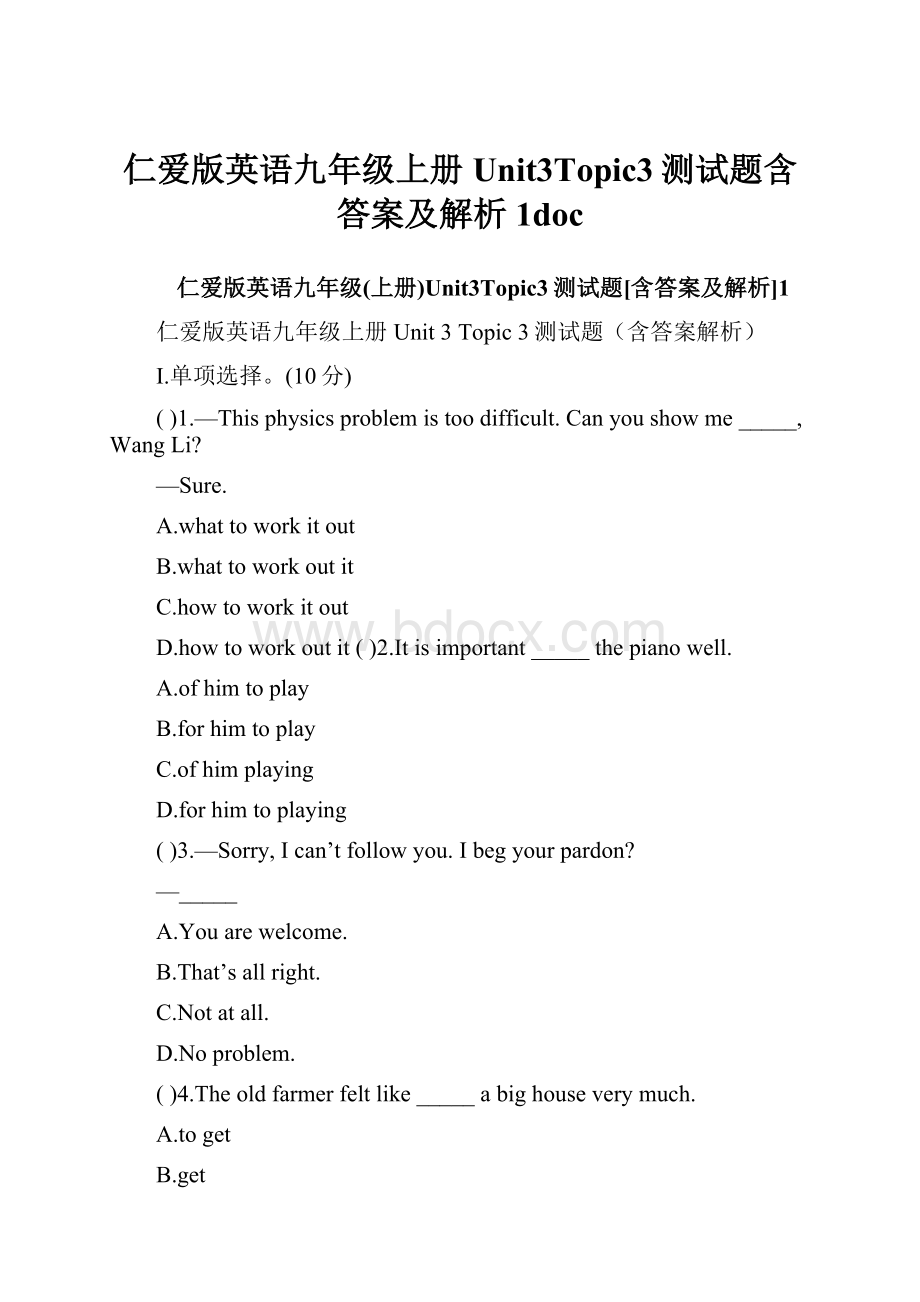仁爱版英语九年级上册Unit3Topic3测试题含答案及解析1doc.docx
《仁爱版英语九年级上册Unit3Topic3测试题含答案及解析1doc.docx》由会员分享,可在线阅读,更多相关《仁爱版英语九年级上册Unit3Topic3测试题含答案及解析1doc.docx(10页珍藏版)》请在冰豆网上搜索。

仁爱版英语九年级上册Unit3Topic3测试题含答案及解析1doc
仁爱版英语九年级(上册)Unit3Topic3测试题[含答案及解析]1
仁爱版英语九年级上册Unit3Topic3测试题(含答案解析)
Ⅰ.单项选择。
(10分)
()1.—Thisphysicsproblemistoodifficult.Canyoushowme_____,WangLi?
—Sure.
A.whattoworkitout
B.whattoworkoutit
C.howtoworkitout
D.howtoworkoutit()2.Itisimportant_____thepianowell.
A.ofhimtoplay
B.forhimtoplay
C.ofhimplaying
D.forhimtoplaying
()3.—Sorry,Ican’tfollowyou.Ibegyourpardon?
—_____
A.Youarewelcome.
B.That’sallright.
C.Notatall.
D.Noproblem.
()4.Theoldfarmerfeltlike_____abighouseverymuch.
A.toget
B.get
C.getting
D.got
()5.She_____walkatnight.Howbravesheis!
A.dareto
B.daresto
C.darenot
D.doesn’tdareto()6.Iwillgotomydoctorfor_____onhealthydiet(饮食).
A.anadvice
B.someadvices
C.anyadvice
D.somepiecesofadvice
()7.It’smyhonor_____togiveatalkhere.
A.toinvite
B.tobeinvited
C.inviting
D.invite
()8.Iusuallygotothemovieswithmyparents,but_____alone.
A.sometimes
B.sometime
C.attimes
D.attime
()9.IfyouwanttolearnEnglishwell,it’susefulto_____beforeclassand_____afterclass.
A.review;preview
B.preview;review
C.review;topreview
D.preview;toreview
()10.Listening,speakingandreadingareallimportant_____writing.
A.beside
B.besides
C.except
D.expect
Ⅱ.情景交际。
(5分)
A:
HowareyougettingonwithyourEnglish,LiKai?
B:
11especiallyinspeaking.WhenIspeakinpublic,Ibecomenervousandmake
alotofmistakes.12
A:
Don’tgiveup.ButdoyouoftenspeakEnglish?
B:
No.
A:
That’stheproblem.Justasyoucan’tlearntoswimifyoudon’tjumpintowater,13
B:
You’reright.ButI’mafraidofmakingmistakes.
A:
Don’tthinklikethat.14especiallyinthebeginning.It’spartofthelearning.
B:
Mmm...Isee.
A:
Verygood.Ihopeyou’lltakeeverychancetopractice.15
B:
OK,Iwill.Thankyouverymuch.
Ⅲ.完形填空。
(10分)
IamastudentinGradeThree.IbegantolearnEnglishthreeyearsago.Englishisn’tvery
16tolearn.ButIlikeitverymuch.
17doIstudyEnglish?
Inthefirstyear,Ifound18verydifficulttomemorizenewwords.Atfirst
I19alotoftimeonthem.Ilearnednewwordsonly20readingandwriting.
21afewdayslaterIforgotthem.Later,withthehelpofmyteachers,Icametoknowhowtodoitwell.Ipaidmoreattentionto22andspelling.Forexample:
ebetheseesetbest
/i//e/
eeseeneedeabreadready
23,Ihavelearnedalotofnewwords.EverymorningafterIgetup,Idosomereading.AtschoolI24tospeakEnglishwithmyclassmatesandgoover25Ihavelearned.
Nothingistoohardifyouputyourheartintoit.
()16.A.hardB.excitedC.easyD.fast
()17.A.WhyB.WhatC.UnlessD.How
()18.A.thisB.itC.thatD./
()19.A.tookB.paidC.spentD.cost
()20.A.withB.forC.asD.by
()21.A.AndB.ButC.ThenD.However
()22.A.pronunciationB.wordsC.readingD.writing
()23.A.BythewayB.InthiswayC.TobeginwithD.Lateron
()24.A.joinB.loseC.tryD.realize
()25.A.thatB.whatC.whichD.when
Ⅳ.阅读理解。
(30分)
(A)
Englishwordsdon’tstaythesame.Peopleneednewwordsfornewideasandnewinventions.Differentwordscomeintouse,oroldwordsareusedinanewway.
Englishcanbechangedbyborrowingwordsfromotherlanguages.Theword“tomato”wasborrowedfromMexicoand“tea”camefromChinaandsoon.Nownewspaceandsciencewordsarebeingborrowedfromothercountries,too.Newwordsareformedbyaddingtwo
wordstogether.“Countryside”and“earthquake”aremadeupoftwoparts.Sometimesnewwordsareshorterformsofoldwords.Theword“photo”wasmadefrom“photograph”bycuttingofftheendofthelongerword.“Plane”wasmadebycuttingoffthefrontpartof“airplane”.Thenamesofpeopleandproductscanbecomenewwords,too.Our“sandwich”wasnamedafteramancalledSandwichand“sellotape”(透明胶带)wasanamegivenbythecompanythatfirstmadetheproduct.
()26.NewEnglishwordsareneededbecause_____.
A.peopleuseoldwordsinanewway
B.thepopulationisbiggernow
C.theoldwordsarenotenough
D.newideasandnewinventionsappearallthetime
()27.WhichofthefollowingwordswastakentoEnglishfromanothercountry?
A.Plane.
B.Sandwich.
C.Tomato.
D.Countryside.
()28.WhichofthefollowingwordscamefromChina?
A.Tea.
B.Earthquake.
C.Airplane.
D.Sellotape.
()29.HowmanywaysofdevelopingEnglishwordsdoesthepassagetellus?
A.Three.
B.Four.
C.Five.
D.Six.
()30.Themainideaofthispassageis_____.
A.thattheEnglishlanguageisalwayschanging
B.thattherearenewideasinEnglandtoday
C.howpeoplenamenewproductsandinventions
D.howpeopleuseoldwordsinanewway
(B)
Inordertoknowaforeignlanguagethoroughly(完全地),fourthingsarenecessary.Firstly,wemustbeabletounderstandthelanguagewhenwehearit.Secondly,wemustbeabletospeakitcorrectlywithconfidenceandwithouthesitation(犹豫).Thirdly,wemustbeabletocompose(创作)sentencesthataregrammatically(语法地)correct.Fourthly,wemustknowhowtoputsentencesintoparagraphs,soastowriteagoodletterorcomposition.
Thereisnoeasywaytosuccessinlanguagelearning.Agoodmemory(记忆力)isofgreathelpbutitisnotsimplyenoughtomemorizerulesfromagrammarbook.Itisnotmuchuselearninglonglistsofwordsandtheirmeaningsbyheart.Wemustlearnwordsnotbythemselvesbutinsentences.Wemustlearnbyusingthelanguage.“Learnthroughuse.”isagoodpieceofadviceforthosewhoarestudyinganewlanguage.Practiceisveryimportant.Wemustpracticespeakingandwritingthelanguagewheneverwecan.根据短文内容,判断正(T)误(F)。
()31.Thepassageismainlyabouthowtolearnaforeignlanguage.
()32.Whenwetrytospeakaforeignlanguage,wemustbelieveourselves.
()33.Thewriteradvisesustouseadictionarywheneverwecan.
()34.Thefirststeplearningalanguageisreading.
()35.“Learnthroughuse.”isagoodpieceofadviceforthosewhoarestudyinganewlanguage.
(C)
WhenyouarelearningEnglish,youfinditstupidtotranslateanEnglishsentence,
wordforword,intoyournative(本国的)language.Takethesentence“Howdoyoudo?
”asanexample.Ifyoulookupeachwordinthedictionary,whatisyourtranslation?
Itmustbeawrongsentenceinyourownlanguage.
Languagesdonotjusthavedifferentsounds,theyaredifferentinmanyways.It’simportanttomastertherulesforwordorderinthestudyofEnglish,too.Ifthespeakerputswordsinaveryunusualorder,thelistenercan’tunderstandthespeaker’ssentenceeasily.SometimeswhentheorderofwordsinanEnglishsentenceischanged,themeaningofthesentencechanges.Let’sseethedifferencesbetweenthefollowingsentences.
Ivisitedmyoldteacheronlyinthecity.(我仅仅在城里看望了我以前的老师。
)
(A)Ivisitedonlymyoldteacherinthecity.
Ihavealightdesk.(我有一张很轻的书桌。
)
(B)Ihaveadesklight.
So,whenyouarelearningEnglish,youmusttryyourbesttograsp(领会)thespiritofthelanguageanduseitasanativespeakerdoes.
根据短文内容,完成下面两个任务。
任务一:
翻译。
36.将画线部分(A)译成汉语:
_______________________________________________
37.将画线部分(B)译成汉语:
_______________________________________________
任务二:
回答下列问题。
38.WhenyouarelearningEnglish,isitclevertotranslateanEnglishsentenceword
forwordintoyournativelanguage?
____________________________________________________________________________39.Ifthespeakerputswordsinaveryunusualorder,whatwillhappen?
____________________________________________________________________________40.WhenyouarelearningEnglish,whatcanyoudo?
____________________________________________________________________________
第三部分写作(25分)
Ⅰ.词汇。
(10分)
(A)根据句意及首字母提示补全单词。
1.Iamveryw_____inEnglish,soI’mgoingtoworkhardatit.
2.Theplanshavebeenunderd_____.
3.MyEnglishteachertoldusmanygoodm_____tostudy.
4.I’msorry,Ican’tfollowyou.Canyour_____that?
5.Whatanicestory!
Canyour_____itinEnglish?
(B)根据句意及汉语提示完成句子。
6.They________________________(坚持弹奏)themusiclateyesterdaynight.
7.Please________________________________(深呼吸)andrelaxyourselfbeforeyou
giveaspeechinclass.
8.Wecanlearnfrom________________(犯错误).
9.Heissoexcitedthathecan’tsay________________(完整的话).
10.Inorderto________________(练习语法),Ikeepadiary.
Ⅱ.句型转换。
(5分)
11.Everyyearthefarmersplantmanytreesonthosehills.(改为被动语态)
Manytrees______________onthosehills_______thefarmerseveryyear.
12.Idon’tknowwhatIshoulddowiththebrokenbike.(同义句转换)
Idon’tknowwhat_____________________thebrokenbike.
13.Don’tgiveuplearningEnglish,it’shelpfultoyou.(同义句转换)
Don’t______________English,it’shelpfultoyou.
14.ThechildrenhadagoodtimeinDisneyland.(同义句转换)
Thechildren______________inDisneyland.
15.Janewouldliketoeatsomefish.(同义句转换)
Jane_____________________somefish.
Ⅲ.书面表达。
(10分)
你的英语非常优秀,学校请你和七年级的同学做一次英语学习经验交流。
请根据下列提示,写一份80词左右的发言稿。
提示:
1.WhendidyoubegintolearnEnglish?
2.WhydoyoulikeEnglish?
3.HowdoyoustudyEnglishwell?
4.takepartin/join,followthetape,keepadiaryinEnglish,rememberwords
参考答案及解析
Unit3Topic3
第一部分听力
第二部分基础知识运用
Ⅰ.1.C本题考查疑问词+不定式结构。
根据句意“你能给我讲讲怎样计算出这道题吗?
”
句中有宾语it,所以选how结构而不选用what结构。
另外,workout这一短语其
后的宾语如果是代词,要把代词放在中间。
故正确答案为C。
2.B本题考查It’s+adj.+forsb./ofsb.+todosth.结构。
在这一结构中,forsb.指的是“对
某人而言”,而ofsb.指的是“某人本身也是”。
根据题意“对他而言,弹好钢琴是
很重要的”,故选B。
3.D本题主要考查Ibegyourpardon?
“请再说一遍好吗?
”的习惯答语。
回答应该为
Noproblem.没问题。
故选D。
4.C本题考查feellikedoingsth.想要做某事。
5.B本题考查dare的用法。
dare表示“敢,竟敢”,既可用作情态动词,亦可用作实义
动词。
用作情态动词,无人称和数的变化,后接动词原形;用作实义动词,有人称
和数的变化,后接动词不定式。
根据题意Howbravesheis!
排除C、D项,故选B。
6.Dadvice为不可数名词,故选D。
7.B本题考查It’sone’shonortodosth.很多同学可能选A项,但invite是及物动词,此
处invite后没有宾语,所以应用其被动语态,此句意为“被邀请来这